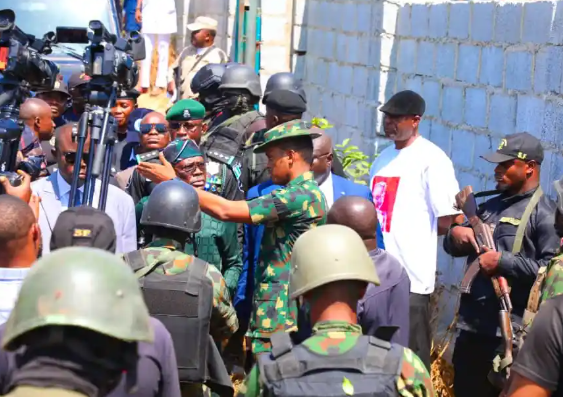BY LEKAN OLAYIWOLA
The recent encounter between FCT Minister Nyesom Wike and Lieutenant Yerima revealed more than tempers; it exposed a system still learning how authority and legitimacy coexist. It was an uneasy dance between civilian command and military professionalism, between the habit of control and the discipline of restraint.
Nigeria’s institutions often fracture at the fault lines of personality. When the Minister invoked executive power and the officer held to procedure, both acted within traditions that shape our history: one of political urgency, the other of military order. Yet when these traditions collide without respect or clear boundaries, gridlock ensues, and public trust is the casualty.
In a state built on civil authority and military legacy, this was no clash of individuals, but a signal that blurred mandates, political impatience, and historical suspicion continue to undermine the quiet strength of legitimacy.
Advertisement
Civil–Military Relations as a Mirror of Political Culture
Civil–military relations are not simply about subordination or command; they are a barometer of political culture. The health of this relationship shows how a state negotiates authority without resorting to domination. Where civilian officials depend on personal force to assert their mandates, and where military officers step into civic space to protect institutional pride, democracy becomes performative rather than procedural.
Nigeria’s enduring dilemma between the military and political class is a shared inheritance of command logic. Both systems (the barracks and the bureaucracy) were shaped by control, not collaboration. The military learned to equate loyalty with silence; the political class learned to equate leadership with fear. In this sense, what played out between Wike and Yerima was not an anomaly but a grammar of control speaking its native tongue.
Advertisement
The Psychology of Legitimacy and the Economy of Respect
Every society runs on an implicit economy of respect: who must defer, who may question, and who may act autonomously. In fragile democracies, respect is often purchased through intimidation, not earned through institutional design. Lt. Yerima’s restraint disrupted that expectation. His calm refusal was not rebellion; it was discipline performed as moral clarity. It represented a psychological inversion, the idea that legitimacy derives from coherence with rule and process.
From a conflict perspective, where control logic produces escalation, clarity logic produces de-escalation. Had Yerima shouted back or Wike invoked coercive instruments, the event might have devolved into open confrontation. His silence was not weakness; it was the discipline that prevented institutional humiliation.
This is precisely what peace studies call negative capability — the ability to hold power without performing it. The soldier’s discipline became a peace act, an embodied restraint that stabilised an otherwise combustible situation.
Advertisement
The Hidden Conflict: Institutional Ambiguity
Beyond being a struggle over incompatible goals, the more dangerous conflicts are those rooted in ambiguous systems where boundaries of role and mandate are unclear. Nigeria’s civil–military tension persists precisely because of this ambiguity: when the state deploys soldiers for civic tasks, it blurs the psychological contract that defines their loyalty.
This lack of clarity breeds calls for structural insecurity, a state where every institution must defend its dignity through self-assertion, rather than through the legitimacy of law. It is why officers guard private property; why ministers personally supervise demolitions; why command must constantly be performed to be believed.
The Wike–Yerima clash thus becomes a metaphor for the absence of trust architecture in Nigerian governance. When roles are not clearly codified or strictly adhered to, every encounter becomes a test of dominance. Peace becomes episodic, dependent on the character of actors rather than the strength of systems.
Advertisement
Conflict Transformation and the Ethics of Role
In peacebuilding, resolution is temporary; transformation is permanent. Transformation occurs when systems evolve beyond their old habits of conflict. For Nigeria, the task is not to punish a minister or praise a soldier, but to transform the operational ethics of both the civil and military spheres.
Advertisement
This means building procedural empathy, an institutional practice where each side recognises the other’s legitimacy without surrendering its autonomy. Civilian authorities must understand that to command effectively, they must institutionalise respect, not perform it. The military must ensure its professionalism never mutates into moral aloofness; clarity must never become quiet contempt.
The equilibrium is delicate but achievable. Many democracies have faced it. the United States after Vietnam, Turkey after the 1980 coup, Ghana after Rawlings. What separates progress from paralysis is the ability to learn institutionally from moments of tension.
Advertisement
The Opportunity for Reform
Conflicts are a form of data, raw intelligence about how systems behave under stress. The data here revealed a minister’s authority contested not through rebellion but through procedure. The military defended one of its own not through denial but through affirmation of discipline. The public sided overwhelmingly with restraint over rage.
Advertisement
Taken together, these signals show an appetite for a new civic contract where the dignity of process outweighs the drama of personality. Peacebuilding institutions, from the Ministry of Defence to the Federal Civil Service Commission, can use this moment to create a Dignity Index for Governance: a measure of how public institutions manage conflict, authority, and respect without coercion. That is how adversarial data becomes design intelligence.
Reclaiming Legitimacy as the Foundation of Peace
The heart of peacebuilding is not the absence of conflict but the presence of justice, the moral and procedural balance that allows power to operate without humiliation. The Wike–Yerima episode, if read structurally, is not a story of confrontation but of civic calibration: a society testing whether it can evolve from obedience to legitimacy. The question is not who commanded or obeyed, but whether the architecture of dignity held. It did barely, and that is progress.
Nigeria’s peace challenge is not insurgency alone; it is the everyday insecurity of authority, a condition where people do not trust institutions to act without bias or coercion. The peace that lasts is not secured by weapons or decrees, but by clarity; every actor knowing their role, every citizen knowing their rights, every leader knowing their limits.
The Limits of Restraint
Lt. Yerima’s restraint, whether deliberate or instinctive, embodied institutional clarity; Minister Wike’s reaction, whether emotional or political, revealed how fragile that clarity remains. The lesson is simple: a society at peace is one where dignity needs no defence.
The officer’s brief remark to the police, viewed by some as dismissive, momentarily dimmed the composure that earned him respect. Professionalism demands not only vertical discipline but horizontal regard; every uniform, civil or military, upholds the same web of authority. When respect falters, legitimacy weakens. The task is to stand not with personalities, but with legitimacy itself.
Lekan Olayiwola is a peace & conflict researcher/policy analyst. He can be reached via [email protected]
Views expressed by contributors are strictly personal and not of TheCable.



